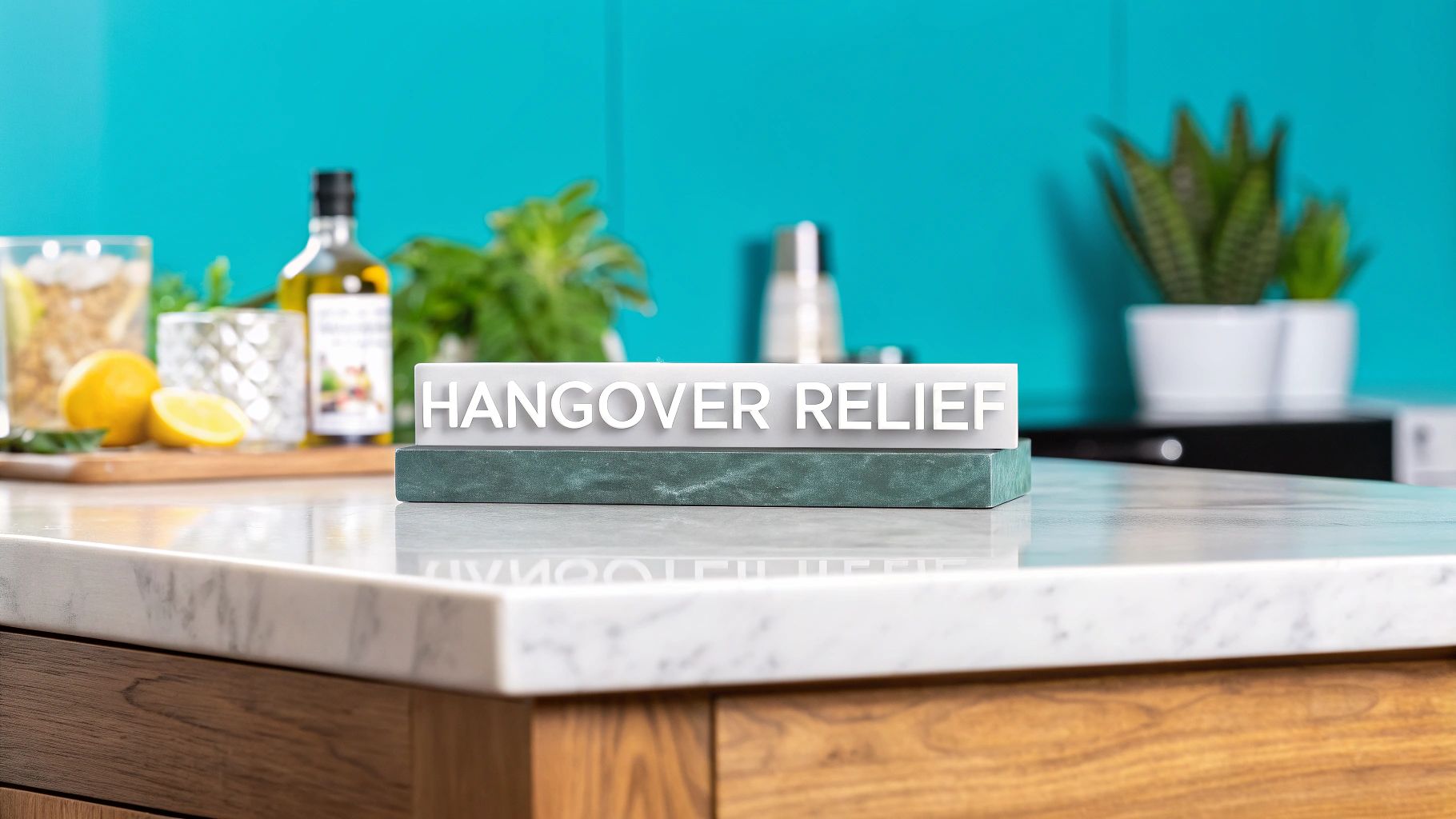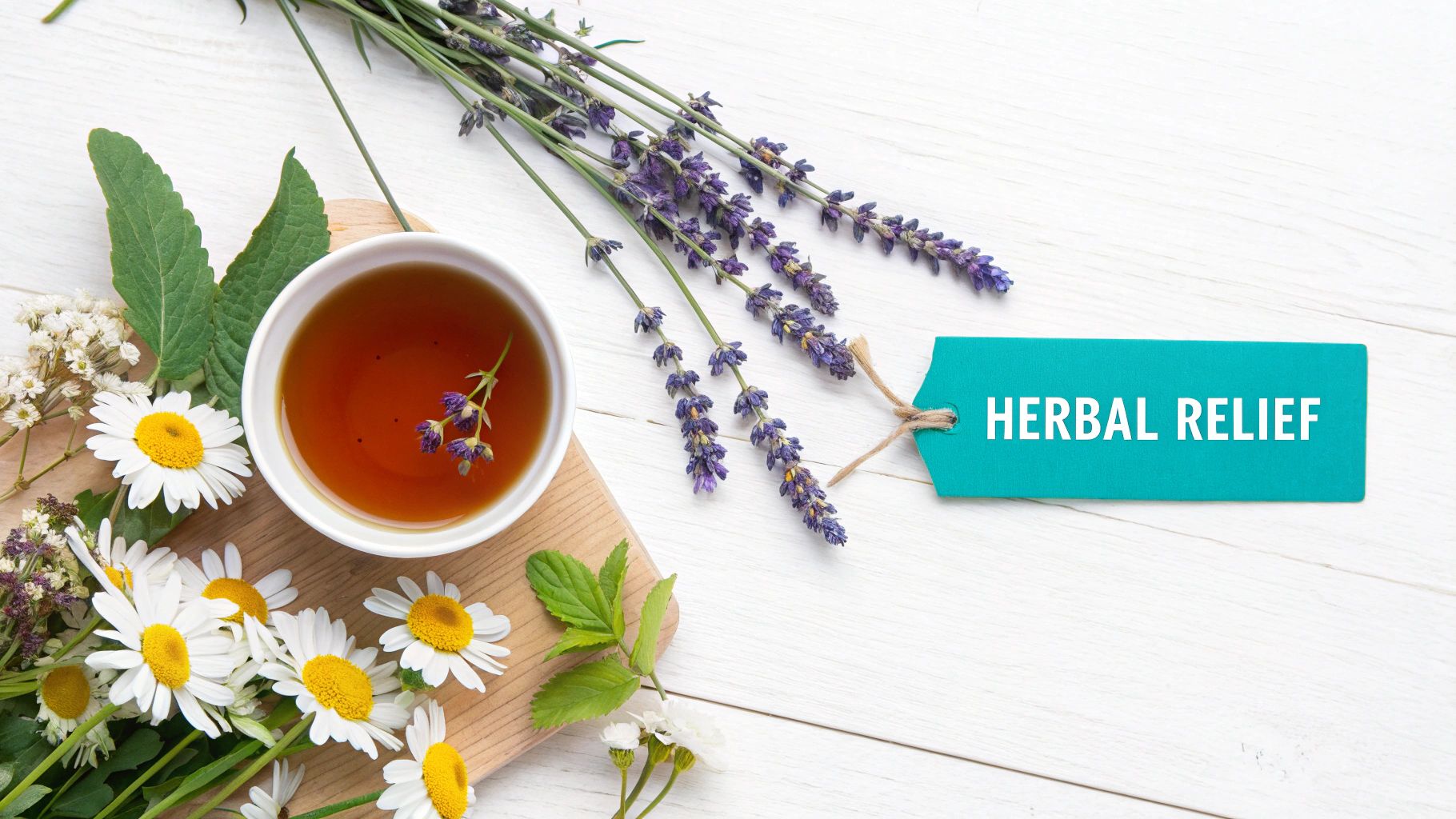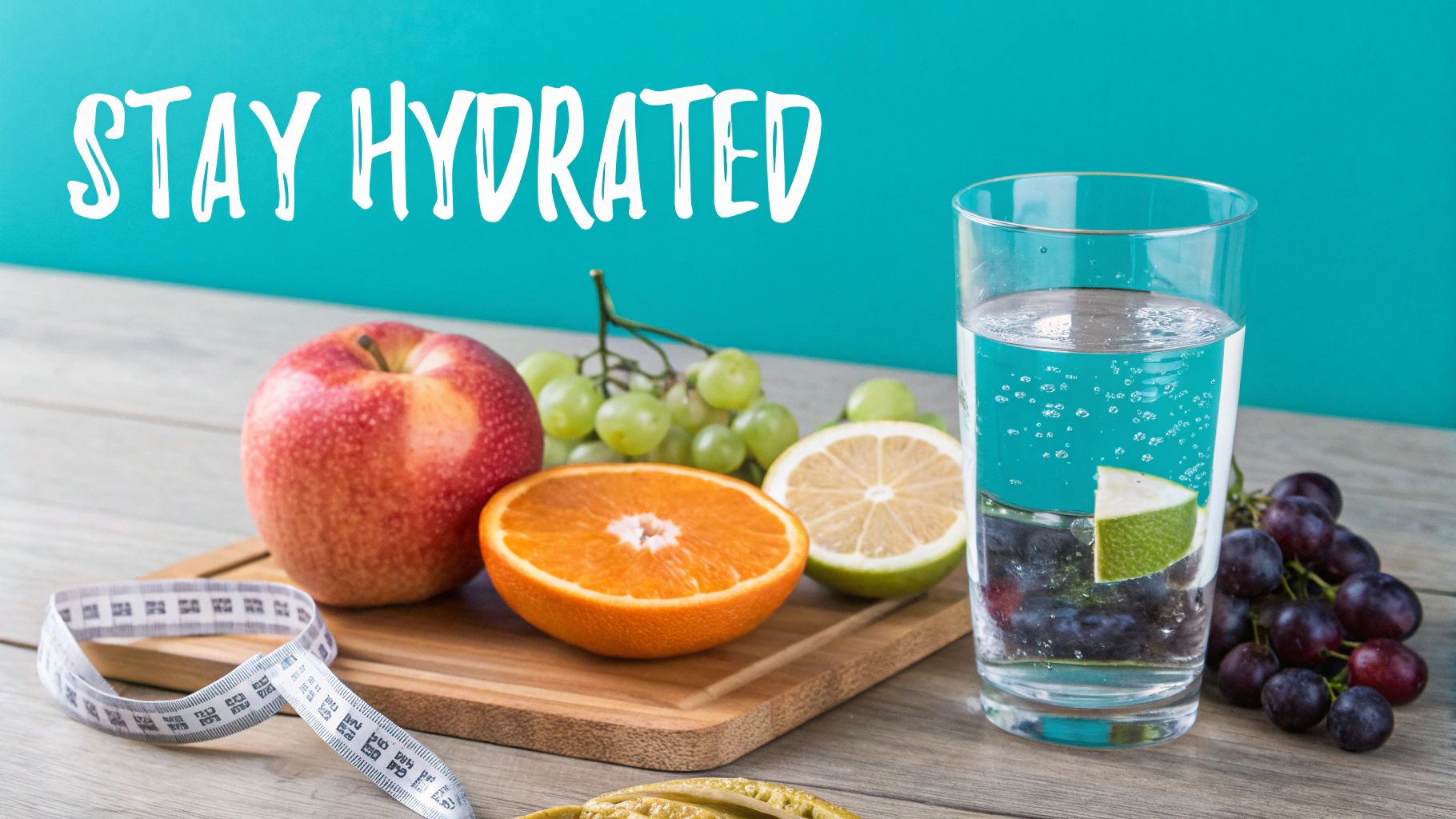

· By Annemarie
How to Cure a Hangover: Fast, Science-Backed Tips
The Science Behind Your Miserable Morning After

That pounding headache, upset stomach, and overwhelming exhaustion—those familiar hangover symptoms aren't just uncomfortable; they're the result of complex biological processes triggered by alcohol. Understanding these processes is the first step toward effective hangover relief. Let's explore the science behind the misery.
Dehydration: The Primary Culprit
Alcohol is a diuretic, increasing urine production. This leads to dehydration, a major contributor to common hangover symptoms like headaches, dizziness, and dry mouth. Even mild dehydration can impair cognitive function and increase fatigue.
Dehydration also disrupts the body's electrolyte balance, adding to your discomfort. This brings us to another key factor: inflammation.
Inflammation: The Body's Response to a Toxin
Your liver works hard to metabolize alcohol, creating a toxic byproduct called acetaldehyde. Acetaldehyde triggers an inflammatory response throughout the body, contributing to nausea, vomiting, and that general feeling of unwellness.
This inflammation also plays a role in the headaches and muscle aches often linked to hangovers. The severity of the response varies between individuals because of genetic factors.
The Role of Congeners and Genetics
The type of alcohol you consume matters. Congeners, chemicals produced during fermentation, give alcoholic beverages their color and flavor. Darker liquors like whiskey and rum tend to contain higher levels of congeners than lighter ones like vodka and gin. These congeners can worsen hangover symptoms.
Your genetics also significantly influence how your body processes alcohol and how severely you experience hangovers. Some people are simply more prone to alcohol's negative effects due to genetic variations in alcohol-metabolizing enzymes.
Global alcohol consumption in 2019 averaged 5.5 liters of pure alcohol per person aged 15 and older, with unrecorded consumption making up 21% of that total. The health impacts are substantial: alcohol causes 2.6 million deaths yearly, contributing to over 200 different diseases and harming those around the drinker. You can find detailed statistics from the World Health Organization.
Understanding the interplay of dehydration, inflammation, congeners, and individual genetics helps you choose effective hangover remedies. This allows you to address the root causes of your discomfort instead of just masking the symptoms.
Fast-Acting Relief For Your Worst Hangover Symptoms

When a hangover hits, you need relief now. This section offers practical, science-backed ways to tackle those dreaded symptoms. We'll cover effective hydration, over-the-counter remedies, and foods that can ease your discomfort. This information will help you create a personalized approach, since everyone experiences hangovers differently.
Hydration Is Key: Replenishing Lost Fluids and Electrolytes
Dehydration is a main culprit behind hangover symptoms. Alcohol's diuretic effect depletes your body's fluids and crucial electrolytes. This leads to headaches, dizziness, and fatigue. Therefore, rehydration is the first step towards recovery.
While water is vital, it's not the only solution. Electrolytes, like sodium and potassium, also need replenishing. Sports drinks or electrolyte tablets can be especially helpful in restoring this balance. Consider alternating between water and electrolyte-rich drinks for optimal rehydration.
Over-the-Counter Relief: Targeting Specific Symptoms
Over-the-counter pain relievers can lessen headaches and muscle aches. NSAIDs (nonsteroidal anti-inflammatory drugs) like ibuprofen can reduce inflammation, a major factor in hangover discomfort. However, avoid acetaminophen (Tylenol) while your liver is still processing alcohol.
For nausea, consider an over-the-counter antiemetic. These medications can help calm your stomach and prevent vomiting. Always follow the recommended dosage instructions.
Food as Medicine: Nourishing Your Body Back to Health
Certain foods can ease hangover symptoms and replenish lost nutrients. Bland foods like toast and crackers can settle an upset stomach. Bananas are a good source of potassium, an important electrolyte lost due to alcohol's diuretic effects.
Broth-based soups provide hydration and electrolytes while being gentle on the digestive system. Eggs contain cysteine, an amino acid that helps break down acetaldehyde, a toxic byproduct of alcohol metabolism.
The following table summarizes some common hangover symptoms, their causes, and potential remedies:
Hangover Symptoms and Targeted Solutions A comprehensive guide to matching specific hangover symptoms with the most effective immediate remedies
| Symptom | Cause | Immediate Solution | Expected Relief Time |
|---|---|---|---|
| Headache | Dehydration, inflammation | NSAIDs (ibuprofen), hydration | 30-60 minutes |
| Nausea | Acetaldehyde buildup, irritation | Antiemetic, bland foods | 15-30 minutes |
| Fatigue | Dehydration, electrolyte imbalance | Electrolyte drinks, rest | 1-2 hours |
| Dizziness | Dehydration, low blood sugar | Hydration, sugary snacks | 15-30 minutes |
| Upset Stomach | Alcohol irritation | Bland foods, broth-based soups | 30-60 minutes |
This table provides a quick reference guide to address your specific hangover woes. Remember, individual responses vary, so find what works best for you.
Effectively addressing a hangover often requires a multi-pronged approach. Managing dehydration, treating pain and nausea, and nourishing your body with the right foods can greatly improve your recovery. Remember to listen to your body and adapt your strategy based on your individual needs.
Natural Remedies That Actually Cure Hangovers

While a quick fix might temporarily alleviate some hangover symptoms, many people are searching for more natural, long-term solutions. This section explores some scientifically-backed natural remedies that can help your body process alcohol's after-effects and get you back on your feet. These remedies focus on assisting liver function, reducing inflammation, and calming nausea.
Supporting Liver Function with Natural Supplements
Your liver is the key organ responsible for metabolizing alcohol. Learning more about overall recovery strategies can provide a helpful context for understanding hangover remedies. Specific supplements can assist your liver during the detoxification process. For example, milk thistle contains silymarin, a powerful antioxidant that protects liver cells from damage. Red ginseng is another helpful supplement shown to improve liver function and reduce inflammation.
Proper dosage and timing are crucial for getting the best results from these supplements. It's always a good idea to talk with a healthcare professional before adding any new supplements to your routine, particularly if you have pre-existing conditions or are taking other medications. This consultation ensures the supplement fits your health needs and prevents any potential negative interactions.
Reducing Nausea and Inflammation with Ginger and Prickly Pear
Nausea and inflammation are at the heart of the hangover experience. Ginger, a widely recognized remedy for nausea, can help soothe the stomach and reduce inflammation. Prickly pear extract has also been shown to be effective in minimizing hangover symptoms, specifically nausea and inflammation.
These natural remedies can be consumed in several ways. Ginger can be taken as a supplement, brewed as a tea, or incorporated into meals. Prickly pear extract is usually available in capsule form. While generally safe, speaking with a healthcare provider is recommended, especially if you're pregnant, breastfeeding, or have any underlying health conditions.
Herbal Teas and Foods for Detoxification
Certain herbal teas can help with detoxification and provide relief from those pesky hangover symptoms. Peppermint tea can soothe an upset stomach, while chamomile tea promotes relaxation and sleep, both essential for recovery. Remember, some herbal teas can be dehydrating, so choose hydrating options carefully.
In addition to tea, certain foods can boost your body's natural detoxification pathways. Foods rich in antioxidants, like berries and dark leafy greens, can counteract the oxidative stress caused by alcohol. This helps support your body’s natural recovery mechanisms.
Interestingly, hangovers are a global phenomenon, but their frequency varies significantly by country. In the UK, about two in ten people regularly experience hangovers, the highest rate among surveyed nations. This is often attributed to binge drinking, a common practice in places like the UK. You can learn more about this here. This data emphasizes the importance of responsible alcohol consumption and finding effective hangover management strategies.
By incorporating these natural methods with healthy lifestyle choices like adequate hydration and sufficient rest, you can manage hangovers more effectively and support your body's natural healing process. Always consult a healthcare professional before starting any new supplement regimen.
Strategic Eating and Drinking for Rapid Recovery

What you eat and drink after a night out can significantly impact how quickly you bounce back. This section dives into the science behind post-drinking nutrition. We'll explore which foods help your body process alcohol, why electrolytes are so important, and how to create a personalized recovery meal plan. Understanding these concepts can help you minimize the duration and intensity of your next hangover.
Post-Drinking Nutrition: Fueling Your Recovery
Alcohol depletes essential nutrients, making replenishing them vital for recovery. Focus on foods that support your liver's detoxification process and help stabilize your blood sugar. Complex carbohydrates, like those found in whole grains, offer sustained energy and prevent the low blood sugar that can worsen hangover symptoms. Protein-rich foods provide the amino acids your body needs for cell repair and rebuilding.
The Electrolyte Equation: Beyond Just Water
While drinking plenty of water is crucial for rehydration, addressing electrolyte imbalances is just as important. Alcohol disrupts your body's electrolyte balance, affecting hydration, nerve function, and even muscle function. This is why specialized recovery drinks or electrolyte tablets can be more effective than plain water for some. These products help restore the proper balance of sodium, potassium, and other essential electrolytes.
The Ideal Hangover Breakfast: Replenishing and Stabilizing
Breakfast is the perfect opportunity to replenish those depleted nutrients. Choose foods that provide sustained energy and stabilize blood sugar. Whole-grain toast with avocado and eggs is a great option, offering complex carbohydrates, healthy fats, and protein. This combination can help combat fatigue and nausea. Conversely, sugary foods, while offering a temporary energy boost, can ultimately worsen symptoms by causing blood sugar crashes.
Matching Your Meal Plan to Your Drinks: Personalized Recovery
Different alcoholic beverages can impact your body in different ways. Craft beers, with their higher congener content, may require a different recovery strategy than a glass of champagne or wine. Tailoring your meal plan to the specific type of alcohol you consumed can optimize your recovery. After a night of darker liquors, for instance, focus on antioxidant-rich foods like berries and dark leafy greens to combat oxidative stress.
To help you make informed choices, let's take a look at the following table which outlines some of the best and worst foods for hangover recovery.
The table below compares foods that can either help or hinder hangover recovery, explaining their effects on the body.
| Food Category | Examples | Benefits/Drawbacks | When to Consume |
|---|---|---|---|
| Complex Carbohydrates | Whole grains, oatmeal | Provides sustained energy, stabilizes blood sugar | Breakfast, throughout the day |
| Protein | Eggs, lean meats, nuts | Provides amino acids for cell repair, helps with satiety | Breakfast, lunch |
| Healthy Fats | Avocado, olive oil | Supports cell function, helps with nutrient absorption | Throughout the day |
| Antioxidant-Rich Foods | Berries, dark leafy greens | Combats oxidative stress, supports liver function | Throughout the day |
| Sugary Foods | Candy, pastries | Temporary energy boost followed by a crash, can worsen symptoms | Avoid |
| Greasy Foods | Fried foods, fast food | Difficult to digest, can worsen nausea and upset stomach | Avoid |
As this table clearly illustrates, making smart food choices plays a significant role in hangover recovery. By understanding the science behind how your body processes alcohol, you can make strategic choices to minimize discomfort and get back to feeling your best. Remember to listen to your body and avoid anything that might worsen your symptoms.
Preventing Hangovers: Strategic Drinking Approaches
The best way to avoid a hangover is to prevent it. This section outlines proactive strategies to minimize hangover severity before you start drinking. We'll explore techniques for pacing yourself, choosing the right pre-drinking meal, and even using supplements. By understanding how your body processes alcohol, you can make informed choices to mitigate the after-effects.
Pacing Yourself: The Key to a Smoother Morning
How quickly you consume alcohol significantly impacts how you feel the next day. Your liver can only process a limited amount of alcohol per hour. Drinking too quickly overwhelms your liver, leading to a buildup of acetaldehyde, the toxic byproduct responsible for many hangover symptoms.
A good rule of thumb is to stick to one standard drink per hour. This pace allows your liver to keep up with alcohol processing and minimizes acetaldehyde buildup. Spreading your drinks out gives your body more time to metabolize the alcohol.
The Pre-Drinking Meal: Setting the Stage for Success
Never drink on an empty stomach. Food slows the absorption of alcohol into your bloodstream, giving your liver more time to process it. Choose a meal containing complex carbohydrates, protein, and healthy fats.
This combination helps slow alcohol absorption and provides sustained energy. A meal with salmon, brown rice, and roasted vegetables offers this ideal balance. This pre-drinking strategy can make a significant difference.
Preemptive Supplements: Giving Your Body a Boost
Some supplements taken before drinking may offer protective benefits. Milk thistle contains silymarin, an antioxidant that supports liver function. Taking milk thistle before drinking might help your liver process the alcohol. Always consult with a healthcare professional before starting any new supplement.
Hydration Timing: A Critical Factor
Staying hydrated is paramount. Dehydration contributes significantly to hangover severity. Alternate alcoholic beverages with water or electrolyte-rich drinks to maintain proper hydration.
This proactive approach can drastically reduce symptoms. Additionally, drinking a large glass of water before bed can further help offset the dehydrating effects of alcohol.
Recognizing Your Limits and Monitoring Intake
Knowing your personal tolerance is crucial. Pay attention to how your body responds to alcohol and recognize your limits. Don't feel pressured to exceed your comfort zone.
Monitoring your intake and pacing yourself accordingly is essential for a pleasant experience and minimizes the risk of a hangover. Making smart choices empowers you to enjoy social occasions comfortably.
Prioritizing Sleep: Enhancing Recovery
Finally, prioritize sleep before and after drinking. Alcohol can disrupt sleep, exacerbating hangover symptoms. Aim for a full night's rest before drinking and try to get as much sleep as possible afterward.
Quality sleep is vital for recovery. The frequency and severity of hangovers are connected to drinking habits. Research indicates those experiencing frequent hangovers may be at higher risk of developing alcohol use disorders. Explore this topic further here.
By adopting these strategies, you can significantly reduce the likelihood and severity of hangovers. Remembering these simple yet effective approaches can help you enjoy your social life without sacrificing your well-being the next day. Making informed choices about your alcohol consumption is key to a balanced and healthy lifestyle.
When Home Remedies Aren't Enough: Seeking Medical Help
While a mild hangover can often be managed at home, sometimes professional medical attention is necessary. It's important to recognize the difference between typical hangover discomfort and more serious issues like alcohol poisoning. This section will help you understand when it’s time to get help.
Recognizing the Signs of Alcohol Poisoning
Alcohol poisoning is a life-threatening condition. Knowing the symptoms is vital for quick action. These symptoms can include:
- Confusion and Disorientation: The person might seem confused, disoriented, or unable to answer basic questions.
- Vomiting: Look for repeated or uncontrollable vomiting.
- Seizures: Be aware of sudden convulsions or muscle spasms.
- Slow or Irregular Breathing: Breathing fewer than eight breaths per minute or long pauses between breaths (ten seconds or more) are warning signs.
- Low Body Temperature (Hypothermia): The person's skin might feel cold and clammy.
- Loss of Consciousness: They may be unresponsive to attempts to wake them.
- Bluish or Pale Skin Tone: This is especially concerning around the lips and fingertips.
If you think someone might have alcohol poisoning, call 911 immediately. This is a medical emergency. Don't leave the person alone, and turn them on their side to prevent choking.
Dehydration Requiring IV Therapy: Beyond Home Hydration
Mild dehydration can usually be handled with fluids and electrolytes at home. However, severe dehydration might require intravenous (IV) therapy. IV therapy delivers fluids directly into a vein, which is much faster and more effective than drinking fluids. Signs you may need IV therapy include persistent vomiting, being unable to keep down fluids, and severe dizziness or lightheadedness. If you’re struggling to rehydrate at home, seek medical help.
Alcohol Withdrawal: A Potentially Dangerous Complication
If someone is dependent on alcohol, suddenly stopping drinking can cause alcohol withdrawal. Symptoms can range from anxiety and tremors to seizures and hallucinations. Severe alcohol withdrawal, also known as delirium tremens (DTs), is life-threatening. If you or someone you know experiences withdrawal symptoms after heavy drinking, seek immediate medical attention. Medically supervised detox is important for safety and symptom management.
Medication Interactions and Pre-Existing Health Conditions
Alcohol can interact negatively with certain medications like pain relievers, antidepressants, and antibiotics. These interactions can decrease a medication's effectiveness or cause serious health problems. If you take medication, talk to your doctor or pharmacist about possible interactions with alcohol.
Also, pre-existing conditions like diabetes, liver disease, and heart conditions can be worsened by alcohol. Heavy drinking can make these conditions more severe and lead to serious health issues. If you have a pre-existing health condition, it's best to discuss alcohol consumption with your doctor.
Knowing when a hangover requires medical attention is key to protecting your health. Don’t hesitate to seek professional help if your symptoms are severe or concerning. This is especially important if you suspect alcohol poisoning, experience withdrawal symptoms, or have pre-existing health conditions.
Looking for a proactive way to manage hangovers? Try Upside Hangover Sticks. These jelly sticks are formulated with natural ingredients and are a convenient way to combat hangover symptoms. Learn more at https://enjoyupside.com.
Article created using Outrank
